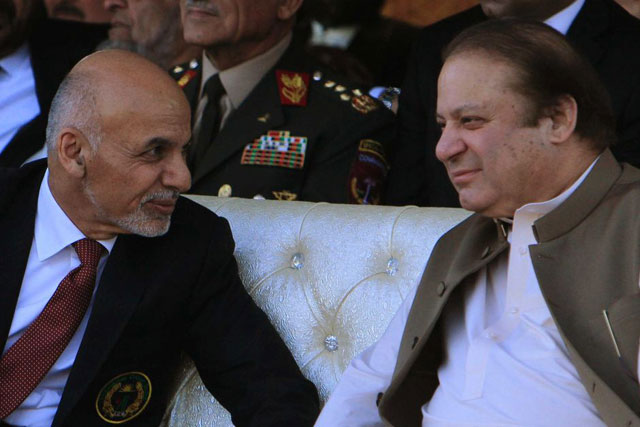
No and no, it seems: Pakistan is all over the place, at a time it can least afford it. But policy coherence is the least of what’s at stake.
To recap: on December 17, 2014 — a day after the darkest we’ve known — the prime minister says there’s no distinction “between good and bad Taliban”. The military’s PR arm says about the same.
Then comes March, when the PM’s foreign adviser says, “We have some influence over [the Afghan Taliban] because their leadership is in Pakistan and they get some medical facilities. Their families are here. We can use those levers to pressurise them to say, ‘Come to the table’.”
Iran denies Mullah Mansour crossed Iran’s border to enter Pakistan
It’s a bombshell. The jig’s up, the world says — Pakistan’s admitted Pakistan’s in on it.
But then comes May: the same gentleman now says “vested interests” are behind the idea that Pakistan’s behind the Afghan Taliban.
Finally, the Foreign Office dives in, to say that Afghan forces better swat away the Taliban offensive — “to realise they would have more to gain on the table than they can do on the battlefield”.
That’s five months and four positions: they are our enemy and must be destroyed. They are your enemy but we have some control over them. We have no control over them. You’d best shake a stick at them before they control you.
Do we know what we’re saying? More important, do we know what we’re doing?
Let’s see how the professionals manage things. Two weeks ago, The New York Times editorial opened: “nearly 15 years after 9/11, the war in Afghanistan is raging and Pakistan deserves much of the blame.”
A time, a place, a good guy, a bad guy: clear and clean messaging. “Time to put the squeeze on Pakistan,” the header reads. From the paper that used Ahmad Chalabi as a source for WMD in Iraq; and continues to sell President Hillary to an electorate that’s never so despised a frontrunner, the Times sells snake oil well.
Story-building at its best, and it’s gone on a while. There was Barack’s pour-your-guts-out legacy interview last month: according to The Atlantic, Obama “privately question[ed] why Pakistan, which he believes is a disastrously dysfunctional country, should be considered an ally of the US at all.”
Then came Congress pulling the plug on F-16 subsidies.
Then came the ‘squeeze’ editorial (which never really discussed how to put said squeeze to Pakistan).
By the end of it, the world was made to remember (having forgotten during Operation Zarb-e-Azb) that Pakistan was behind all Western woes in Kabul.
Frequent traveler Mullah Mansour used Pakistan airports
But no one cared. Until last Saturday, complacency came easy to Islamabad: who takes the State Department seriously? The US bumbles into its longest war yet, kills tens of thousands of Afghans, and backs deranged drug kingpins — only to watch the Taliban take back Helmand. What a mess, we said.
Now there’s war fatigue and donor fatigue; the US pulls out, and Pakistan gets to be the fall guy.
Much of this is accurate. But accuracy went into a tailspin Saturday, when a drone roared into Balochistan and blew up Taliban boss Akhtar Mansour — in the middle of the afternoon, across a major highway.
John Kerry talked about it. Abdullah Abdullah tweeted about it. The world raved about it. Pakistan went for radio silence. After all, what was left to say?
A hundred questions arise, each as bad as the last. There’s the terrifying ingress, obviously: where once drones were supposed to kill Nek Muhammad and never be heard from again, they now get to fly over Balochistan (i.e., 43 per cent of the country’s territory) and carry out cross-border assassinations wherever, whenever, and however the Oval Office feels like.
Then comes the fact of it: Mansour was very much in Balochistan, was very much near Quetta, and the ‘Quetta Shura’ wasn’t dreamt up by a sinister cabal (it’s very much a sinister cabal itself).
It’s no wonder the Afghan state — weak and venal as it is — distrusts its neighbour: the Mansour days spelt bloody murder for Kabul.
And Kabul’s clutching at straws. Inching closer are the same old warlords; gents that belong to a zoo from the ’80s. Acid-throwing Gulbuddin has made his peace; human incinerator Dostum never left. No one would want to leave their children’s future in the hands of these men. No one should ever have to.
But Ashraf Ghani needs to survive as president before he gets to outrun the past. He once saw Pakistan as part of that future, and stuck his neck out. Yet here Pakistan is, stuck in 1989.
At what point do we realise a militant is a militant is a militant? Or that ‘strategic depth’ is a pipe dream; a mad plot thrown together by hacks like Aslam Beg and Asad Durrani a generation ago — that it defies history, geography, and good sense?
For the Pakistani state to be stable, the Afghan state must be stable. It’s time to pulp the past, and embrace Mr Ghani. It’s time to pincer-grip the militants in the middle — Pakistani, Afghan, Uzbek — and end this long nightmare.
Already we’re losing out on the world stage — everywhere else too. “Iran was the first country to recognise Pakistan as an independent state,” foreign policy whiz Fahd Humayun reminded us recently in another paper, “There was a time when Pakistan Day was celebrated in the streets of Tehran.”
Mullah Mansour or Muhammad Wali: Fake name but genuine credentials on CNIC
But this year, Iran will stage training exercises across our border, even as it makes a commercial comeback (we’re implicated in the former, and uninvolved in the latter).
Even the conversations we have are tired: India ‘hems us in’, China ‘pulls us out’, Iran ‘looks away’, and Pakistan sways per the winds.
It’s time for a diplomatic offensive abroad, and a moral offensive at home: no more Taliban hideouts, no more drones blasting said hideouts, no more fog of war.
The tail is wagging the dog: we have nothing to gain in not going after these people. We have nothing to gain in crying ‘sovereignty’ over drones by day, while pointing where to hit by night.
We have nothing to gain by playing the Great Game — for too long, the Great Game’s been playing us. And it’s time to walk away.
It’s time, 37 years later, that Pakistan thought about Pakistan.
Published in The Express Tribune, May 24th, 2016.
Like Opinion & Editorial on Facebook, follow @ETOpEd on Twitter to receive all updates on all our daily pieces.












COMMENTS (34)
Comments are moderated and generally will be posted if they are on-topic and not abusive.
For more information, please see our Comments FAQ